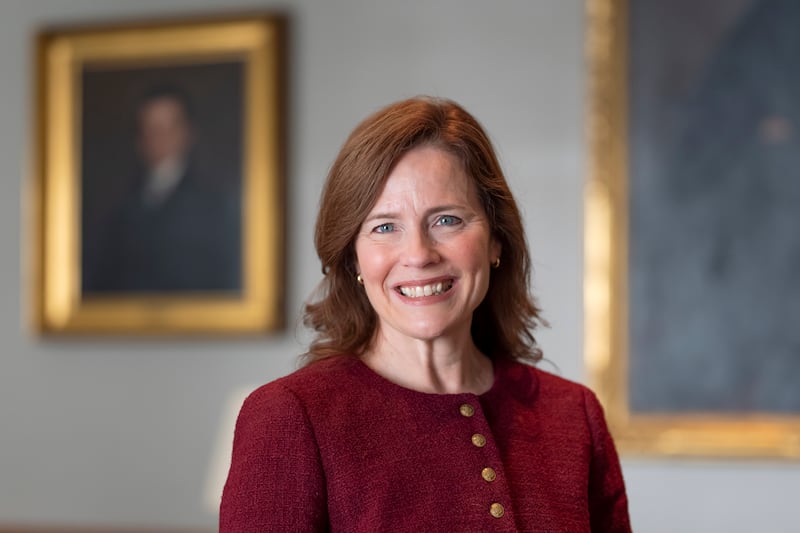Ahead of her book release Tuesday, Justice Amy Coney Barrett joined CBS News for an interview, one of her first since joining the Supreme Court in 2020.
In the interview, Barrett defended the judicial branch as a nonpolitical entity and gave insight into the lead-up to overturning Roe v. Wade.
She also gave a peek into the power-dynamic on the bench.
Does Justice Barrett ‘have beef’ with Justice Ketanji Brown Jackson?
CBS reporter Norah O’Donnell referenced fellow Justice Ketanji Brown Jackson’s dissent in the Supreme Court’s ruling in the birthright citizenship case from June and Barrett’s response.
Barrett notably wrote, “We will not dwell on Justice Jackson’s argument, which is at odds with more than two centuries’ worth of precedent, not to mention the Constitution itself.”
“She made a spirited argument, and so I thought it merited a spirited response, but it was about the merits; it was about the case,” Barrett said. “I have great respect for Justice Jackson.”
Her relationship with Jackson is good now and has been good since it began, Barrett said. When Jackson joined the court in 2022, Barrett threw her a welcome dinner. “I found out what her favorite foods were. I found out that she really loves the musical ‘Hamilton,’ so I had a Broadway singer come and sing her selections from ‘Hamilton,’” she said.
The Supreme Court is “a place where we can have disagreements but still get along,” Barrett said. “We can really debate ideas, sometimes vigorously as you pointed out, but it doesn’t inhibit our ability to be colleagues and friends.”
Are the justices ‘enabling the president to act without meaningful checks’?
Barrett rejected the premise of O’Donnell’s question. “Justices and courts, district courts, are not trying to enable Congress or the executive to do anything. We are deciding cases,” she said.
She continued, “The question might suggest that the court has some agenda or some motive, and that’s just wrong.”
It is not the job of the Supreme Court to “look across the docket and even things out,” Barrett said. “That’s the antithesis of what our job entails. Our job entails making legal judgments about the cases that come before us.”
Sometimes the court will render unpopular decisions, “because sometimes the right legal answer isn’t necessarily the popular one,” Barrett said.
Can Trump legally deploy the National Guard?
O’Donnell asked whether President Donald Trump is “right” when he says he has “unlimited power” to deploy the National Guard to any state, and Barrett took a moment to explain why she could not answer the question.
“Any particular legal issues — I mean, I might be sitting there with my kids watching TV, and I might have an idea about it — but if I’m going to decide something as a judge, it really has to happen in the context of a particular case,” she said.
Judges must approach things with an open mind, specific facts, briefs, oral arguments, conversations with law clerks and more, she explained. “At any step in that process I might change my mind from my initial reaction. In fact, I often do.”
Roe v. Wade, gay marriage and contraceptives
Barrett voted to overturn Roe v. Wade in the Dobbs v. Jackson Women’s Health Organization decision in June 2022.
Defending her decision, Barrett said, “Any medical procedure is not mentioned in the Constitution ... the Constitution leaves virtually every question like that to the democratic process, to the American people.”
“I think the main message of Dobbs … is that those decisions ... are not the Supreme Court’s to make,” Barrett continued. “Virtually every decision is left to the democratic process, because you don’t want the Supreme Court picking and choosing which rights it thinks should be fundamental, and which rights it thinks should be removed from the democratic process.”
O’Donnell asked again if Coney Barrett believes gay marriage and contraceptives should be returned to individual states, and she replied, “The courts should not be imposing its own values on the American people. That’s for the democratic process.”
She added that overturning Roe v. Wade did not render abortion illegal. It also “did not say anything about whether abortion is immoral,” she said. “Dobbs said that these are questions that are left to the states.”
Are we in a constitutional crisis?
When asked if she believes the United States is in a constitutional crisis since Trump took office for the second time, Barrett said, “I don’t know if I could give a definition of a constitutional crisis, because I don’t know that we’ve really faced one in this country.”
However, Americans have faced “a series of constitutional challenges.”
“We have the oldest written constitution in the world, and I think we should rightly be proud of that. It has survived for a long time. I’m optimistic that it will continue to do so, and that we’ll have another 250 years or more to go,” she said.


